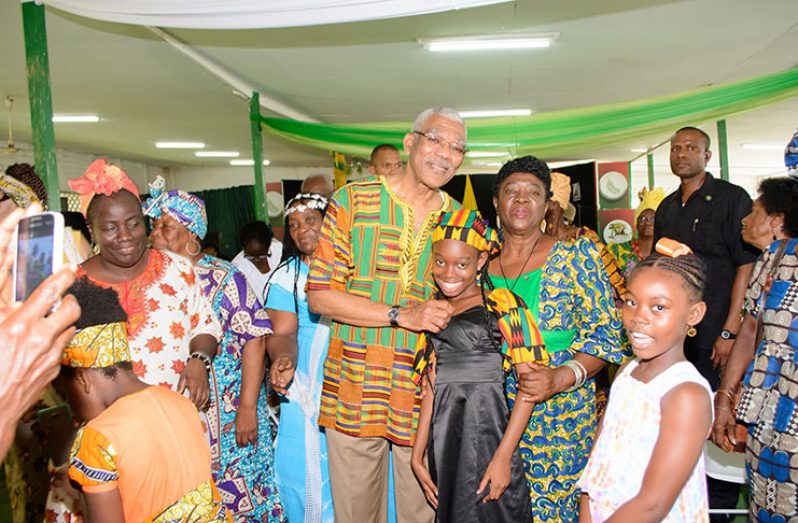—at Ghana’s 60th Anniversary celebrations
GUYANA could see the resurgence of a once vibrant cottage industry, following a call Sunday by President Granger for local villages to become more involved in manufacturing.

The call comes days after Minister of Finance, Mr Winston Jordan,announced that the manufacturing sector only accounts for five per cent of the country’s Gross Domestic Product (GDP).
Speaking at a ceremony at Congress Place to mark Ghana’s 60th Anniversary, President Granger reminded his audience that after local African slaves were emancipated, it was to agriculture that they turned in order to make a living.
Those were the days, he said, when families were given two sections of land, one on which to plant and the other to build a home.
“During that time, persons produced their own food, and the economy was based on trade, manufacturing and so forth.”
Harking back to what Minister Jordan said at a recent press conference, that with the traditional sectors not performing as well as they should, Guyana would do well to become more involved in manufacturing, President Granger said:
“Get into manufacturing; open packaging plants and factories! Villagers can do simple things by planting guava and using them to make jams and jellies; villages today are empty, so the villagers need to get involved in various manufacturing activities.”
He made the point that while persons still rely on Georgetown to find work, opportunities for growth and development might very well be knocking right in their very own communities and are being overlooked.
He ended by implying that one way of bucking the employment trend is to go back to the land. “People who produce and sell are superior to those who consume and buy,” the president said.
According to the Guyana Office for Investment (Go-Invest) on its website, the manufacturing sector has been dedicated to the processing of traditional agricultural products such as rice, sugar, forest products and minerals, basic consumer items, food and beverages, and pharmaceuticals for local consumption.
GO-INVEST CALL
But while these traditional manufacturing activities remain important, there is a growing interest to expand into value-added, export-oriented manufacturing industries.
The website outlines that there is a particular interest in expanding Guyana’s garments and apparel sector to build upon recent successes, and to take advantage of preferential access to foreign apparel markets under preferential trade agreements with the US, EU, Canada, CARICOM and other bilateral trading partners.
In addition to favourable market access for most manufactured products, Guyana provides a number of advantages to investors interested in establishing or expanding manufacturing operations.
One which was outlined by Go-Invest is the competitive cost of labour, because Guyana has one of the lowest manufacturing wage rates in the Caribbean and Central America, with a workforce that is highly literate and trainable.
Another advantage is what in the industry is called low ‘time-to-market’, meaning that Guyana’s close proximity to the US market gives it a shorter time to market to countries such as China and India.
“This advantage is useful for companies wishing to find suppliers to meet their just-in-time delivery requirements,” the website says.












